Among the complexities of data collection, analysis, and publication, using the right tools can significantly enhance productivity, accuracy, and innovation. From managing vast datasets to ensuring detailed citations, the contemporary researcher’s toolkit is packed with advanced software and platforms to streamline various facets of the research process.
This article demonstrates the best tools for researchers, offering a comprehensive guide to the essential digital resources that can transform your research journey, making it more efficient and impactful. Let’s analyze these research tools as indispensable allies in the pursuit of knowledge and discovery.
Top benefits of tools for research
In fact, the value of research tools cannot be overstated. These invaluable resources serve as gateways to a wealth of knowledge, allowing individuals and institutions alike to delve deeper into subjects of interest. The advantages of tools for researchers resonate across diverse fields and disciplines, from scholars to entrepreneurs, students to policymakers. Let’s explore the all-around benefits they offer.
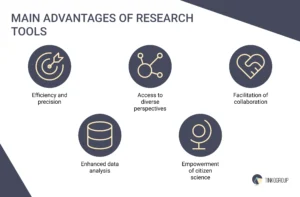
Efficiency and precision
Tools for researchers streamline the process of gathering information, significantly enhancing efficiency. Gone are the days of poring over endless library volumes; with digital databases and search engines, researchers can pinpoint relevant sources within seconds. Advanced search algorithms ensure precision, allowing users to sift through vast troves of data quickly. These tools enable users to locate specific information swiftly and accurately, whether it’s academic papers, market reports, or historical archives.
Access to diverse perspectives
One of the most profound benefits of research tools is their ability to expose users to various perspectives. Nowadays, knowledge knows no boundaries and research tools serve as bridges to diverse cultures, ideologies, and viewpoints. Through online journals, forums, and collaborative platforms, individuals can engage with scholars and experts from around the globe, gaining insights that transcend geographical and cultural barriers. This exposure fosters intellectual growth, critical thinking, and a deeper understanding of complex issues.
Facilitation of collaboration
Tools for researchers facilitate collaboration on a scale never before imagined. Whether co-authoring a paper with colleagues halfway worldwide or crowdsourcing data for a community project, these tools help individuals to work together seamlessly. Cloud-based platforms enable real-time collaboration, allowing multiple users to edit documents, share resources, and exchange ideas effortlessly. Such collaborative environments foster innovation and synergy, driving progress in fields ranging from science and technology to social sciences and humanities.
Enhanced data analysis
The ability to analyze and interpret vast datasets is invaluable. Research tools equip users with sophisticated analytical capabilities, enabling them to extract meaningful insights from complex data sources. From statistical software to data visualization platforms, these tools offer a range of techniques for analyzing data, identifying patterns, and making evidence-based decisions. Whether predicting market trends, understanding social phenomena, or advancing scientific research, enhanced data analysis is a cornerstone of modern inquiry.
Empowerment of citizen science
Research tools have democratized the scientific process, empowering individuals outside traditional academic circles to contribute meaningfully to research endeavors. Through citizen science platforms, ordinary people can participate in scientific studies, collect data, and collaborate with researchers on real-world projects. From monitoring environmental changes to classifying celestial objects, citizen scientists are vital in advancing scientific knowledge and addressing pressing global challenges. By using the collective intelligence of the masses, tools for researchers are transforming the landscape of scientific inquiry.
How to select the optimal research tools?
Choosing the right research tools is crucial for the success of any research project. Whether you are a student, academic, or professional researcher, the right tools can streamline your work, enhance productivity, and improve the quality of your research.
Below is a broad guide to help you choose the proper tools for research.
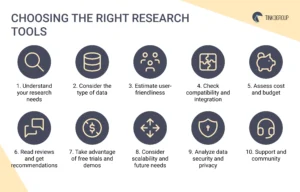
1. Understand your research needs
The first step in selecting the right research tools is to understand the specific requirements of your research project. This includes defining the scope, objectives, and methodologies of your study. Ask yourself the following questions:
- What type of data will you collect (quantitative, qualitative, or both)?
- What are your research questions or hypotheses?
- What resources (time, budget, expertise) are available to you?
By answering these questions, you can narrow down the necessary tools, such as statistical software, survey tools, or qualitative analysis software.
2. Consider the type of data
Different digital tools for researchers are designed for various types of data. Tools like SPSS, SAS, R, and Microsoft Excel are popular choices for quantitative data. These tools offer robust statistical analysis capabilities. For qualitative data, tools like NVivo, ATLAS.ti, and MAXQDA can help code and analyze textual data.
Consider tools that can handle both data types if your research involves mixed methods. For example, Dedoose and QDA Miner are universal options that support mixed-methods research.
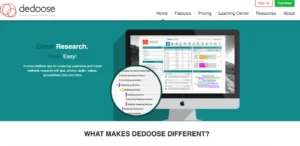
3. Estimate user-friendliness
The ease of use of a research tool is an essential factor to consider. A tool that is difficult to use can slow down your research process and increase the likelihood of errors. You can look for tools with intuitive interfaces, good documentation, and robust user support communities. Many software providers offer tutorials, webinars, and customer support to help users get the most out of their tools.
4. Check compatibility and integration
Ensure that your chosen research tools are compatible with your existing systems and software. For instance, if you are using Microsoft Office for document preparation, selecting a tool that integrates well with Excel or Word can save time and reduce compatibility issues.
Additionally, consider how well the tools integrate. For example, if you are using a survey tool like Qualtrics to collect data, ensure it can export data in a format that is easily imported into your chosen statistical analysis software.
5. Assess cost and budget
Cost is a significant factor in choosing tools for research. Some tools are expensive and may not be feasible within a tight budget, while others are free or offer substantial discounts for students and academic researchers. Open-source tools like R and Python are powerful and free alternatives to commercial software.
However, it is also essential to consider the total cost of ownership, including the purchase price and the costs of training, maintenance, and potential add-ons or upgrades. Sometimes, investing in a more expensive tool with better features and support can be more cost-effective in the long run.
6. Read reviews and get recommendations
Before making a final decision, read reviews and get recommendations from colleagues, mentors, or other researchers in your field. Academic forums, research communities, and social media groups can be valuable resources for getting honest feedback about various tools. Also, positive and negative reviews should be considered to get a balanced perspective.
7. Take advantage of free trials and demos
Many research tools offer free trials or demo versions. Take advantage of these opportunities to test the tools before committing to a purchase. During the trial period, evaluate the tool’s functionality, ease of use, and how well it meets your research needs. This hands-on experience can be invaluable in making an informed decision.
8. Consider scalability and future needs
When choosing tools for researchers, consider your future needs and your current project. If you plan to conduct similar research in the future, select tools that can scale with your growing needs. This might include tools that offer more advanced features, support larger datasets, or provide better integration with other systems as your research portfolio expands.
9. Analyze data security and privacy
Data security and privacy are critical considerations, especially if your research involves sensitive or personal information. Ensure your tools comply with relevant data protection regulations and offer robust security features. Moreover, look for tools that provide encryption, secure data storage, and transparent privacy policies.
10. Support and community
Finally, the level of support and the community regarding the research tools should be considered. Tools with active user communities can provide additional resources, such as forums, user-contributed tutorials, and plugins. Official support from the tool’s developers, including customer service and technical support, is also crucial, particularly for resolving any issues that may arise during your research.
Discover a list of 20+ best tools for researchers
In the realm of research, having the right tools can significantly enhance productivity, accuracy, and the overall quality of your work. From literature discovery to data analysis and project management to writing and publishing, a wide array of specialized tools are available to assist researchers in various stages of their projects.
Here, our experts discover the best tools for researchers across different categories, providing insights into their features and benefits. Let’s check them together!
Literature search and discovery
Finding relevant literature is often the first step in any research project. Practical literature search tools can save time and provide access to a vast repository of academic papers, articles, and other scholarly works.
Literature search tools help researchers discover existing research, track citations, and stay updated with the latest developments in their field. These tools for researchers offer powerful search capabilities, filtering options, and sometimes even personalized recommendations based on your research interests.
Google Scholar
This tool provides a simple way to search for scholarly literature across many disciplines and sources broadly. It offers features like citation tracking, related articles, and the ability to create personal libraries.

PubMed
A free search engine accessing primarily the MEDLINE database of references and abstracts on life sciences and biomedical topics. It is one of the best tools for researchers in the health and life sciences.
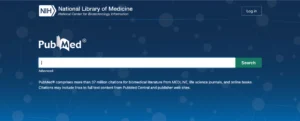
ResearchGate
A social networking site for scientists and researchers to share papers, ask and answer questions, and find collaborators. ResearchGate also provides access to millions of research papers and offers metrics on the impact of publications.

Survey and data collection tools
Collecting primary data through surveys is a standard method in various research fields. Survey tools provide an efficient way to design, distribute, and analyze surveys.
So, survey and data collection tools enable researchers to create surveys with various question types, distribute them to a broad audience, and analyze the responses. These digital tools for researchers often include features like skip logic, real-time analytics, and integration with other software.
SurveyMonkey
An easy-to-use tool for creating surveys and questionnaires. It offers various templates, advanced design features, and robust analytics.

Qualtrics
A powerful survey tool with advanced features for complex survey design, distribution, and data analysis. It is widely used in academic research for its flexibility and comprehensive analytical capabilities.

Typeform
Known for its user-friendly interface and visually appealing surveys, Typeform allows for interactive and engaging survey experiences, which can lead to higher response rates.
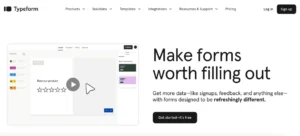
Reference management tools
Managing references and citations is critical for academic writing. Research management tools help researchers organize their references, format citations, and create bibliographies.
These tools streamline managing references, allowing researchers to store, organize, and cite sources effortlessly. They support various citation styles and can integrate with word processors for seamless citation management.
Zotero
A free, open-source tool that helps collect, organize, cite, and share research. Zotero integrates with web browsers to capture citation information and supports various citation styles.

Mendeley
A reference manager and academic social network that helps you organize your research, collaborate with others online, and discover the latest research. It also offers PDF annotation and sharing features.
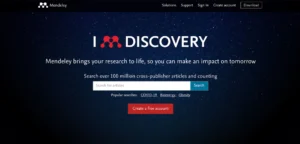
EndNote
A comprehensive research management software that allows for extensive citation and bibliography creation. It supports many citation styles and integrates well with word processors

Data analysis and statistical tools
Analyzing data accurately is crucial for validating research hypotheses and deriving meaningful conclusions. These research tools provide the necessary statistical and computational power to handle complex datasets.
Data analysis and statistical tools offer data manipulation, statistical testing, and visualization functionalities. They satisfy various levels of statistical expertise and can handle large datasets, making them essential for empirical research.
Stata
A powerful statistical software used for data analysis, data management, and graphics. It is known for its user-friendly interface and extensive documentation.
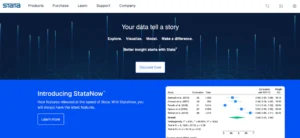
MATLAB
A high-level language and interactive environment used for numerical computation, visualization, and programming. It is widely used in engineering, science, and economics for its robust analytical capabilities.
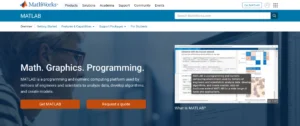
IBM SPSS
A software package used for statistical analysis in social science. It is known for its ease of use and extensive statistical analysis capabilities, making it a popular choice for researchers in various fields.
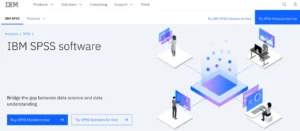
Project management and collaboration
Managing research projects effectively requires organization, communication, and collaboration. Research management tools help researchers plan, track, and collaborate.
These tools facilitate the organization of tasks, timelines, and resources. They enable team collaboration through shared workspaces, communication channels, and real-time updates, ensuring that research projects are completed efficiently and effectively.
Trello
A visual tool for organizing tasks and projects using boards, lists, and cards. It is simple to use and highly customizable, making it ideal for managing research workflows.
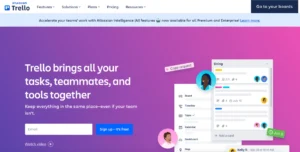
Slack
Within various research management tools, Slack is a collaboration hub that connects teams with the apps, services, and resources they need to get work done. Slack provides real-time messaging, file sharing, and integrations with other tools.

Asana
A project management tool that helps teams coordinate and manage their work. It offers task assignments, project timelines, and progress-tracking features, making it a comprehensive tool for research project management.

Data visualization tools
Presenting data in a clear and engaging manner is critical for communicating research findings. These tools for researchers help create compelling charts, graphs, and other visual data representations.
Data visualization tools allow researchers to transform complex data into visual formats that are easier to understand and interpret. These tools for researchers offer various visualization options and customization features to suit different types of data and presentation needs.
Tableau
A leading data visualization tool that helps create interactive and shareable dashboards. It is known for its ease of use and powerful visualization capabilities.

Power BI
A business analytics tool by Microsoft that provides interactive visualizations and business intelligence capabilities with an interface simple enough for end users to create their own reports and dashboards.
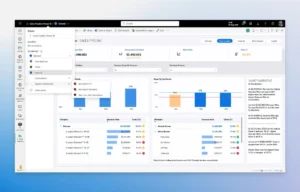
Plotly
A graphing library that makes interactive, publication-quality graphs online. Plotly supports various chart types and is known for its interactive and visually appealing outputs.
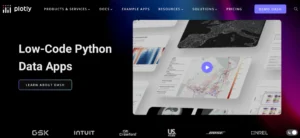
Writing and publishing tools
Effective writing and publishing are critical components of the research process. Writing tools help researchers draft, edit, and format their manuscripts, while publishing tools assist in submitting and managing publications.
These web research tools provide features for drafting, editing, and formatting academic manuscripts. They also offer grammar and style-checking tools, collaborative writing, and manuscript submission, ensuring researchers can produce high-quality publications.
Scrivener
A powerful content-generation tool for long documents. It helps researchers organize their drafts, notes, and research materials in a single place, making it easier to manage complex writing projects.

Grammarly
Among various AI tools for researchers, Grammarly is a writing assistant that helps with grammar, punctuation, style, and tone. It is an essential tool for ensuring the clarity and correctness of academic writing.

Overleaf
A collaborative online LaTeX editor that allows researchers to write, edit, and publish scientific documents. Overleaf supports real-time collaboration and integrates with various journal submission systems.

Plagiarism checking tools
Ensuring the originality of research is key. Plagiarism-checking tools help researchers detect and avoid unintentional plagiarism by comparing their work against extensive databases of published content.
These research software tools scan research papers for similarities with other works. They provide detailed reports highlighting potential issues and offer suggestions for proper citation, ensuring the integrity of academic work.
Turnitin
A widely used plagiarism detection service that compares submitted papers to a vast database of academic content. It provides detailed similarity reports and is commonly used by educational institutions.

PlagScan
An online plagiarism-checking tool that analyzes texts against numerous sources to detect possible plagiarism. It offers detailed reports and integrates with various learning management systems.
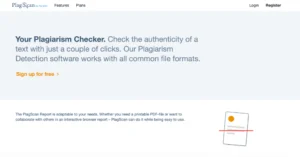
iThenticate
A professional plagiarism detection tool used by researchers, publishers, and institutions to check the originality of manuscripts. It is known for its comprehensive database and detailed similarity reports.

Internet research services at Tinkogroup
At our data processing company, we understand the critical role that high-quality Internet research plays in driving success. We offer robust Internet research services designed to meet our clients’ diverse needs, providing them with the insights they need to stay ahead in their respective fields.
Why choose our Internet research services?
- Expertise: Our team of researchers has extensive experience in various fields, ensuring high-quality and reliable research.
- Accuracy: We use trusted research software tools and rigorous methodologies to ensure the accuracy of our data.
- Timeliness: Our specialists understand the importance of timely information and strive to deliver our research promptly.
- Confidentiality: We prioritize the privacy and security of your information.
In general, our data processing company offers a wide range of Internet research services tailored to meet the needs of businesses, academics, and individuals. From market research to social media analysis, our services are designed to give you the insights you need to succeed. Trust us to be your partner in guiding the complex information landscape and making data-driven decisions that grow success.
Bottom line
The right research tools facilitate smoother workflows and enable researchers to delve deeper into their inquiries, uncovering insights that might otherwise remain hidden. By integrating these best tools for researchers into your research methodology, you can enhance your work’s precision, organization, and overall quality. Employing these tools helps researchers focus more on innovation and less on administrative hurdles, paving the way for discoveries and advancements.
At Tinkogroup, we understand researchers’ unique challenges. Our advanced data processing solutions are designed to streamline your research processes, ensuring you can focus on what matters most—making impactful discoveries. Contact us today to learn how we can enhance your research capabilities and drive your projects to new heights. Your journey to breakthrough insights starts here!
What is the difference between tools and methods in research?
Research tools are the resources used to collect, analyze, and interpret data. Examples include software (e.g., SPSS), and hardware (e.g., spectrometers). Research methods are the systematic procedures employed. They outline the approach for gathering data (e.g., experimental design).
What are the best AI tools for researchers?
The best AI tools for researchers vary depending on the specific needs of their research but generally include natural language processing (NLP) tools (OpenAI's GPT-4), machine learning platforms (TensorFlow), data analysis tools (Stata), collaborative tools (Asana), and more.
What are primary research tools?
Primary research tools are instruments or methods for collecting firsthand data directly from original sources. These tools include surveys, questionnaires, interviews, observations, experiments, focus groups, diaries, journals, and more.

